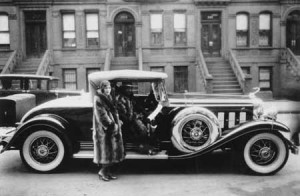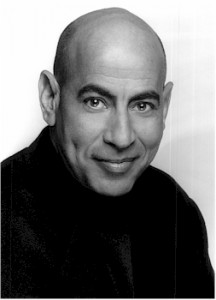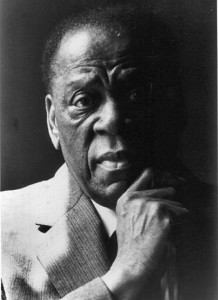Songs From The Harlem Renaissance
Harlem Rhapsody: Music and Poetry of the Harlem Renaissance

Jazz Age Couple in Harlem by James Van Der Zee, 1932.
There was a time when Harlem was the center of the universe for many African Americans. Thousands of blackness families institute a place to call dwelling house in this new suburb of Manhattan north of Central Park in the 1920s. Black churches and political organizations sprang up side by side door to black theaters, dance halls and dives. This 'meeting' of poets and musicians, intellectuals and entrepreneurs gave rising to the Harlem Renaissance, a time when all things seemed possible. All forth Harlem's bustling Lenox Avenue, optimism was in thursday and cash jingled in the pockets of stylish new suits. Information technology was the earth of the "New Negro" whose ideas and art are at the heart of the Jazz Age.

Poet Langston Hughes. Photo courtesy The Kennedy Heart
Riverwalk Jazz captures the high spirit of the Harlem Renaissance with a program combining music of Duke Ellington, Eubie Blake, Fats Waller and James P. Johnson with the poesy of Langston Hughes, celebrated as the "Poet Laureate of the Harlem Renaissance." Special guests on this broadcast are film and theater legend William Warfield and Broadway's Vernel Bagneris who nowadays Hughes' poetry in tandem, and piano virtuoso Dick Hyman sitting in with The Jim Cullum Jazz Band.

Vernel Bagneris. Photo courtesy Riverwalk Jazz
The 1921 hit musical Shuffle Forth brought blackness rhythms to Broadway and with its all-blackness cast and score past Eubie Blake, Shuffle Along was the "wake-up phone call" that launched The Harlem Renaissance. Other black musicals followed in the wake of Shuffle Forth, merely aught could impact its success until Runnin' Wild in 1928 and its hit song "The Charleston." Equanimous by James P. Johnson, "The Charleston" is performed here by Vernel Bagneris on vocals with The Jim Cullum Jazz Band.
A high bespeak of Harlem music was the long tenure of Knuckles Ellington and His Orchestra at the notorious Cotton Club, where mobsters called the shots while white celebrities in diamonds and minks enjoyed glittering floor shows, starring the greatest blackness entertainers of the day. In spite of the strange civilization collision at the Cotton Lodge, Ellington created some of the most enduring jazz songs in history—"Blackness and Tan Fantasy," "Mood Indigo" and "Creole Love Call."

William Warfield. Photograph courtesy Riverwalk Jazz
Harlem composers interested in 'elevating' their art sought to present their music in the concert halls of New York. W.C. Handy and James P. Johnson were amidst those who succeeded. In 1928 W.C. Handy put on the cultural effect of the year every bit Carnegie Hall hosted its get-go evening of black music—a concert of jazz, blues, work songs, and spirituals—with a full choir and orchestra on stage. The highlight of the evening was Yamecraw: A Negro Rhapsody, a "serious" concert piece composed past James P. Johnson. It was given its premier functioning that night by Johnson's protégée—a young Fats Waller at the pianoforte. The Jim Cullum Jazz Band presents their dazzling arrangement of Yamecraw with the twin pianos of John Sheridan and Dick Hyman.

Shuffle Forth Cast with Eubie Blake. Photo courtesy Maryland Historical Society
In Harlem'due south rich cultural stew, a remarkable young poet raised in the midwest plant his voice. Langston Hughes heard of the success of Sissle and Blake'sShuffle Along and knew he had to come to Harlem to discover out what was going on for himself. He was xix years old in 1921 when he published his kickoff poem, A Negro Speaks of Rivers, which is presented hither by William Warfield along with other serious works including I, Too, Sing America. Harlem nightlife teased out a playful side in Hughes' poetry, equal to his serious work. Hither, Vernel Bagneris performs Hughes' Harlem Sweeties, Lenox Avenue Midnight, and The Cat and the Saxophone (2am).
Photograph credit for dwelling house page teaser paradigm:
Cotton Lodge Ext 1920s. Photograph courtesy NFO.net
Text based on Riverwalk Jazz script by Margaret Moos Pick ©2008
Songs From The Harlem Renaissance,
Source: https://riverwalkjazz.stanford.edu/?q=program/harlem-rhapsody-music-and-poetry-harlem-renaissance
Posted by: websterobabounceept.blogspot.com


0 Response to "Songs From The Harlem Renaissance"
Post a Comment